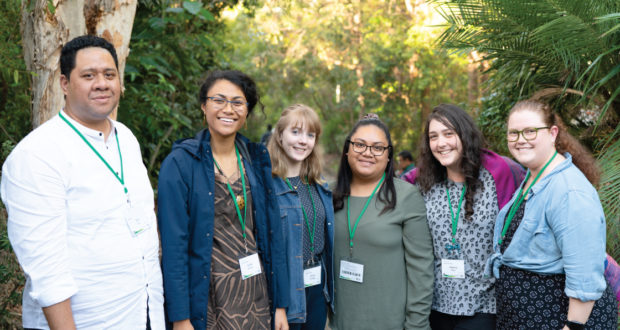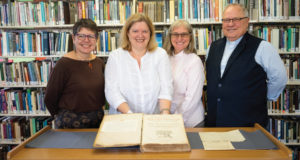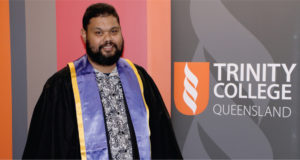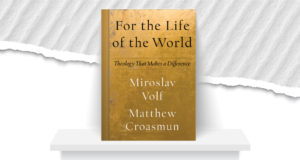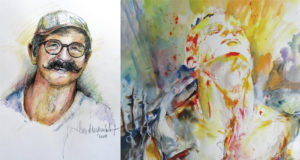While the rest of the nation voted, the Queensland Synod was sowing the seeds for the future. Journey recaps the 34th Synod in Session.
What legacy will we leave for the next generation? When the 34th Queensland Synod of Australia’s first homegrown church met at Alexandra Park Conference Centre from 17 to 20 May, there was a palpable sense that this was the time and the place to take a bold step into the future.
Synod members gathered from across the state to hear familiar and new voices and to glimpse the depth and breadth of the church in action. In this busy, joyful and sometimes difficult space, members worked through the uniquely collaborative decision-making processes of the Uniting Church and were inspired to sow seeds that others might reap the harvest.
New chapter in First Peoples engagement
The 34th Synod in Session opened with a powerful Welcome to Country by the traditional Gubbi Gubbi owners, represented by Lyndon Davis and the Gubbi Gubbi Dance troupe who began with the distinctive haunting sounds of the didgeridoo before sharing local stories, songs and dances linked to Indigenous knowledge and experience of the region.
This set an inspirational tone for the launch of the inaugural Covenant Action Plan by project workers Natalie Lewis and Erin Mawhinney, who described the plan as the next chapter in the Synod’s commitment to ongoing engagement with First Peoples.
“Over the next ten years, the vision is to fully express covenant in all we do, in strong, healthy and intentional relationships.” To find out more, read this article.
Called to communities of faith
In his opening address Moderator Rev David Baker called on the church to remember the core and heart of our life together, and to never underestimate our distinctiveness.
“Our fundamental purpose is people, not property or money,” said David. “Jesus Christ is what we have to offer, not ourselves. We are called to be communities that bear witness to God’s coming reign.”
David said that the greatest challenge the church faces “is that we worry about ourselves; that we seek to shape our life in a way that addresses only our concerns and fears
about our life”.
“To be the church here is to be a people who have confidence and hope for the life of the world; to believe that we have to offer the promise and the challenge of the kingdom of God to the life of Queensland.”
Abundant grace, liberating hope
President of the Uniting Church in Australia Dr Deidre Palmer reiterated the Assembly’s theme for her triennium, “Abundant grace, liberating hope”, and explored its connection to the everyday work of the church.
“This theme highlights for us Christ’s call to be a church that embodies God’s abundant grace, compassion and love in our daily life,” said Deidre.
“In a time where our world is overshadowed by violence, by hatred and suspicion of the other, the church is called to live an alternative narrative of hope and reconciliation.”
Moderator-Elect named
Rev Andrew Gunton was elected to the role of moderator-elect. Andrew has previously served as Presbytery Minister at Moreton Rivers Presbytery as well as interim Associate General Secretary (Queensland Synod). He has held congregational ministerial placements in Rockhampton, Arana Hills and Oxley-Darra where he is currently minister.
Project Plenty
Synod in Session saw the launch of Project Plenty, a new whole-of-Synod strategic planning exercise that will shape the Synod in the future.
The 18-month process will involve consultation with presbyteries and congregations and collaboration and alignment with agencies and schools.
At the heart of the process is the question: How can we as one church contribute effectively to God’s mission in Queensland and the world?
As the church considers this question, the Moderator encouraged members to go beyond the “poverty mentality” which has become part of church life.
“In the midst of the challenges we are facing as a Christian community—the sense of aging, declining, keeping up the assets … the question I want us to think about is the generosity of God.”
Proposals and reports
A number of proposals were considered by Synod in Session, ranging from voluntary assisted dying to governance and how Synod Standing Committee meets.
With respect to voluntary assisted dying, the Synod passed a proposal indicating that it did not support the legalisation of voluntary assisted dying in Queensland and if legislation was passed, Uniting Church facilities will not provide this as a service and our staff, in the course of their employment, will not participate in medical acts to end a life through voluntary assisted dying.
The motion requested Wesley Mission Queensland and UnitingCare to develop a policy and practice approach in light of the Synod’s position and any legislative requirements.
Synod in Session also heard presentations from Synod governing bodies.
The Board for Christian Formation reported an increase in the number of students attending Trinity College Queensland with 12 students presenting as candidates for ordination and a total enrolment in lay courses of 158 people throughout 2018.
Chair of the Board for Christian Formation, Rev Gwen Fisher also highlighted the decision to advise the Adelaide College of Divinity that Trinity College Queensland would be seeking a new Tertiary Education Quality and Standards Agency (TEQSA) accreditation provider.
College faculty took the opportunity to launch Trinity on Tap, a new online learning resource. Each Trinity on Tap resource will include podcasts and a supplementary guidebook containing diagrams, quotes and questions. The first series, Old Testament, is now available.
Ralph Collins presented the Finance, Investment and Property Board report in his capacity as Chair.
Highlights included the impact of the revision of the Synod-wide Treasury Policy to allow investment into more growth-orientated assets that comply with the Synod Ethical Investment Policy. The amount of $30 million was invested into three managed funds over the long-term (seven-plus years); these investments are expected to generate higher than cash returns which will help rebuild the Synod Reserve Fund.
The Board reported the continued rebuild of the Synod Reserve Fund, the emergency fund for the Synod.
Agencies set clear goals in challenging times
Wesley Mission Queensland (WMQ) CEO Geoff Batkin outlined the challenges of delivering aged care and the hope that the Royal Commission into Aged Care Quality and Safety would act to ensure the viability of this sector.
“The overwhelming message is that there is not enough staff, and that means there is not enough funding to provide the number and quality and training of staff that our oldest, most vulnerable residents need,” he said.
Since the last Synod, WMQ has continued on a path of growth in response to emerging community need. This entails a program of redevelopment and/or significant renovation of older aged care homes, growing service responses for people living with disability or mental illness, growing support services for palliative and end-of-life care services and expanding retirement living offerings.
Geoff also highlighted WMQ’s commitment over the next five years to partnering with Uniting Church congregations to provide supported disability accommodation options for people with high and complex care needs.
UnitingCare Queensland CEO Craig Barke told Synod members that the organisation was committed to forming and re-forming relationships at the congregational level, acknowledging that links had not always been close in the past.
“We operate from over 500 sites and there’s every chance we have a site near your congregation, and we are keen to provide a way for your congregation to exercise their call,” he said.
Highlights from the report include the development of an affordable housing strategy and implementation plan, implementation of CARE phase II targeting foster and kinship carers across the state, and continued work to support clients and employees transitioning to the National Disability Insurance Scheme.
Craig outlined the challenges of operating in a tough environment in which the organisation is increasingly exposed to competition and financial pressures.
In response, a 2030 strategy has been developed that sets clear strategic guardrails to rein in costs and grow the organisation where sustainable and where there is a strong community need.
Making mission possible
Presbytery ministers gathered to launch the Presbytery Mission Program, a collection of missional projects that will be promoted throughout the next term until the 35th Synod in Session.
The initial project, church planting, was profiled with a video that explored four church plants across the state at various stages of development; SurfChurch in Bargara near Bundaberg, BELLS Community Church on the Sunshine Coast, Highfields Community Church and Newlife Brisbane.
To find out more about the program, read the articles profiling church planting and SurfChurch in this edition of Journey magazine or visit ucaqld.com.au/presbyterymissionprogram
Future missional projects include youth and young adult ministry, Indigenous ministry, rural and remote ministry and multicultural ministry.
Norman and Mary Millar Lecture
Professor Anne Tiernan—Dean (Engagement) at Griffith Business School, Griffith University—delivered the Norman and Mary Millar Lecture.
In her address, Professor Tiernan examined the role of anchor institutions—universities, schools, churches, hospitals and others deeply connected to their communities and places in a civil society experiencing a “dramatic loss of confidence and trust”.
“I strongly believe that we—the churches, universities and other civic and public purpose organisations—have the capacity and potential to do what modern politics
cannot,” said Professor Tiernan.
Professor Tiernan suggested the answer, at least in part, comes in the form of “cross-sectoral partnerships, unconventional alliances and coalitions that leverage our respective capacities, gifts and talents in the service of the greater good and purpose to which we are called”.
Celebration of ministries
The Moderator presented the 2019 Spirit of the Synod Award to Rev Johnson Makoti from Atherton Uniting Church, describing his leadership as truly inspiring and “a credit to your faithfulness to your call to be a minister”.
Rev Dr Clive Ayre was honoured for his service with the Synod Ecumenical Relations Award.
The celebration of ministries worship service markeda special moment at Synod, with newly ordained ministers, retired ministers and their partners, and the families of those who have passed away attending the afternoon service.
Newly ordained ministers presented to Synod by Rev John Ruhle (Associate General Secretary) and Rev Nigel Rogers (Trinity College Queensland) were: Rev Moira Dodsworth, Rev Peter Blake, Rev (James) Neil Storey, Rev Noah Kim, Rev Santina Waugh and Rev Iris Marais.
Retiring ministers were given a Minute of Appreciation honouring their faithful life of ministry.
The following people were honoured: Rev Alan Charles Robinson, Rev Brian Gilbert, Rev Bruce Johnson, Rev Dr David Mackay-Rankin, Rev Euan McDonald, Rev Dr Jennifer Mary Tymms, Rev Col Shenfield, Rev Denis Harth, Rev Glenn Mulcahy, Rev Iris Reedman, Rev Robert Michael Miles, Rev Lynette Falkenhagen and Rev Ian Proctor.
Memorial Minutes were read honouring the life and witness of ministers who have passed away since the last Synod.
The following people were honoured: Rev Graham Dudley Hall, Rev James Francis McConaghy, Rev John Edward Gillanders, Rev Graham John Desmond Wessel, Rev Jovilisi Nataro Ragata, Rev Owen Marks, Rev Alan George Anderson, Rev Bruce Alexander Ross, Rev Douglas James Brandon, Rev Dr Bruce Warwick Upham, Rev Dr Lewis Arnold Born, Pastor Viki Ashford, Pastor Pauline Ann Denning, Rev Dr Norma Spear, Rev Sidney James (Jim) Hamer Tame, Rev Leslie John Tilse and Rev Silas Wolmby.
Moderator’s Medals were awarded to Robyn Carmichael (Ashgrove West Uniting Church), Bev Taylor (Beenleigh Region Uniting Church), Bev Currie (Lifeline Sarina), Betty Perrin (Rosewood Uniting Church), Bev Lacey (Maroochydore Uniting Church), Marlene Burgess (Malanda Blue Care), David Seeto (St Andrew’s Hospital), Craig and Julianne Ashton (Pilgrim Aged Care), Irene Batzloff (St Stephen’s Toowoomba), Bau Earle (The Wesley Hospital), Jan Bayton (Pine Rivers Uniting Church) and June Rice (Moggill Uniting Church).
Sowing for the future
The theme of sowing flowed through to the closing worship as Moderator Rev David Baker and General Secretary Rev Heather Den Houting reflected on the importance of remembering the legacy of the past as we plan for the future.
“The one who calls us is faithful, so let us live in the light of the promised coming and let us live with peace and confidence,” said David in his message of encouragement.
“We plant for someone else, not for ourselves, because we are part of the big narrative of God’s mission for the world,” said Heather. “As we look at the legacy that has been left for us, what is the legacy we are planting?”
Sponsors of the 34th Synod, particularly Wesley Mission Queensland were thanked for their ongoing support of the church’s mission in Queensland.
The 35th Synod in Session will be held at Alexandra Park Conference Centre in October 2020.
At the 34th Synod in Session the following members were elected:
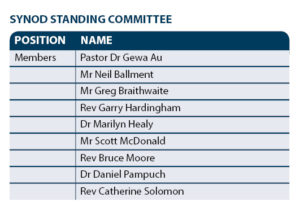
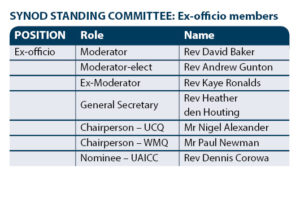
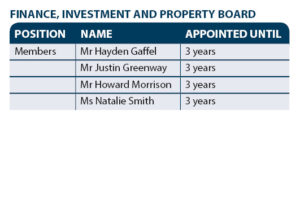
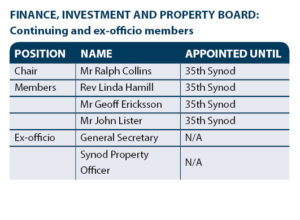
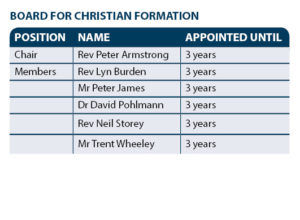
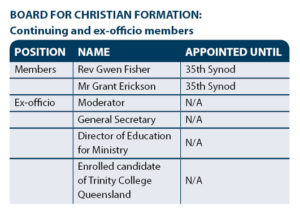
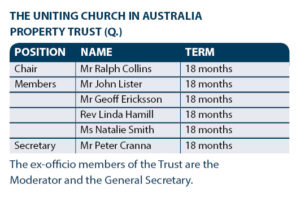
 JourneyOnline
JourneyOnline
